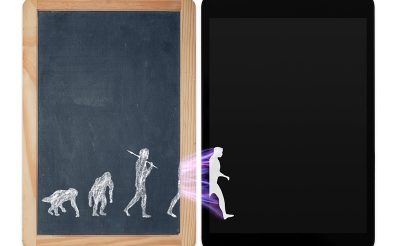How to survive the ‘Fourth Industrial Revolution’

Many people believe that Australia is on the cusp of another industrial revolution. The ‘Fourth Industrial Revolution’, as it is being called, is heralding a period where technology is proving instrumental in reshaping our workforce and ironically also supporting the nation’s ability to rapidly adapt to technological change. Over the past 5 years, significant transformation has already occurred in the workplace globally.
The disruptive nature of technology, the pace of social change, an aging population and the impact of social networks are having a huge impact on how people work. Generational changes that have seen the workforce become more diverse, traditional full-time roles replaced by part-time work and the growth of the ‘Gig Economy’ where workers are abandoning traditional 9-to-5 employment in favour of working independently, mean that traditional career models may soon be a thing of the past. Data has revealed for example that 4.1 million Australians, or 32% of the workforce had freelanced between 2014–2015.
As employees seek more flexible work arrangements, organisations are continuing to grapple with some key challenges, which include:
- The fall in Australia’s productivity — with productivity continuing to fall this is becoming a global competitiveness issue
- Continued difficulty in accurately identifying what drives employee performance and accessing quality talent
- Difficulty engaging staff in a way that contributes to enhanced performance and long term loyalty
- ‘Social Bleed’ — social issues such as increased mental health becoming more prevalent in workplaces
These changes will have significant implications for recruitment, education and vocational training, as well as HR and business more broadly moving forward. Businesses are already starting to feel challenged by this quantum shift in the workplace and are looking for more effective ways of identifying, recruiting and deploying talent in an agile manner.
Here are 3 top areas that we recommend businesses prioritise this year in their strategies:
-
Engagement
With a shocking number of unengaged employees (60%) in Australia, it should come as no surprise that Australia’s productivity continues to fall; threatening our global competitiveness and ultimately our quality of life. It’s clear that that the workplace needs to modify the traditional management paradigm.
The ‘always on’ mentality of the modern world means workers are seeking compensation in the form of a more rewarding workplace experience. The ability of leaders to deliver an engaging experience to employees will be critical.
-
Finding the right fit
Employee engagement starts with aligning the needs and expectations of an employee with the reality of the corporate culture and role at the outset. Recruitment practices need to focus on truly getting ‘fit’ right, which requires greater emphasis on the emotional aspects of engagement, rather than simply skills and experience.
-
Prioritising Emotional Fitness
As technology continues to automate transactional tasks, the true value of people in the fourth industrial revolution lies in their emotional and social intelligence. The ‘emotional labour’ aspect of people centric roles, coupled with the pace of change in the modern organisation, demands a new type of fitness: Emotional Fitness (EF); the mental and emotional strength to navigate change, manage stress and ‘show’ up in the right mindset to engage others. This needs to be recruited for and developed in the modern workplace.
Skills for the future?
Given that 65% of primary school children today will be doing jobs in the future that don’t currently exist, there is no doubt that new skill sets will be required. However, The Institute of the Future has identified social and emotional intelligence in the list of the top 10 skills required in the future.
Developing the Emotional Fitness of the workplace, individual employees and leaders should be treated as a priority.
Recruiting for and developing the ‘Emotional Fitness’ of employees and leaders leads to greater employee engagement, enhanced employee wellbeing, better customer experiences, increased sales and an accompanying boost in productivity levels. At FuturePeople, our FutureFit ™ Program enables organisations to measure, develop and enhance their Emotional Fitness and performance.
By prioritising ‘Emotional Fitness’ in the workplace, we believe that today’s leaders can start the process of creating the dynamic and engaging work culture which the fourth industrial revolution demands.